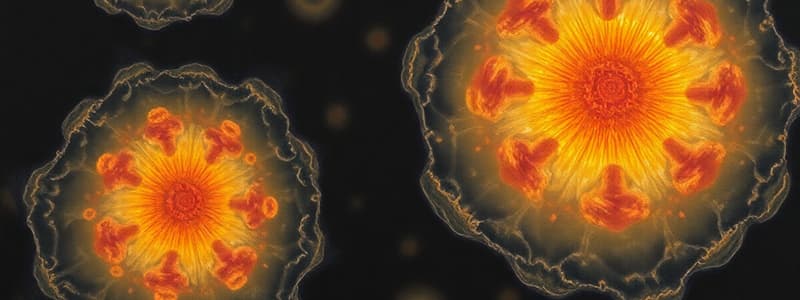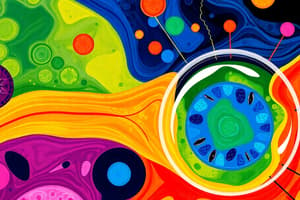Podcast
Questions and Answers
Which characteristic best describes eukaryotic cells?
Which characteristic best describes eukaryotic cells?
- They can be unicellular or multicellular. (correct)
- Their cellular division occurs through binary fission.
- They lack a nucleus.
- They reproduce only asexually.
In the context of human body cells, which organelle is primarily responsible for energy production?
In the context of human body cells, which organelle is primarily responsible for energy production?
- Endoplasmic reticulum
- Ribosome
- Mitochondrion (correct)
- Nucleus
What is a common feature of both eukaryotic and prokaryotic cells?
What is a common feature of both eukaryotic and prokaryotic cells?
- Presence of organelles
- Containment of genetic material (correct)
- Ability to perform photosynthesis
- Development of a cell wall
Which organelle is primarily involved in the synthesis of proteins?
Which organelle is primarily involved in the synthesis of proteins?
Which of the following statements regarding the human body is accurate?
Which of the following statements regarding the human body is accurate?
Flashcards
Eukaryotes
Eukaryotes
Cells with a nucleus and other membrane-bound organelles.
Cell Organelles
Cell Organelles
Specialized structures within a cell that perform specific functions.
Human body cells
Human body cells
Cells that make up the human body.
Cytoslogy
Cytoslogy
Signup and view all the flashcards
Membrane-bound organelles
Membrane-bound organelles
Signup and view all the flashcards
Study Notes
Cell Theory
- All living things are made up of cells
- The cell is the structural and functional unit of all living things
- All cells come from pre-existing cells by the process of division
History of Cell Discovery
- Robert Hooke (1665): Observed cells in cork
- Anton van Leeuwenhoek (1680): Observed single-celled organisms; first microbiologist to study muscle fibers, bacteria, spermatozoa, and blood flow in capillaries
- Robert Brown (1833): Discovered the nucleus in plant cells
- Matthias Schleiden (1838): Stated that cells are the basic building blocks of plants
- Theodor Schwann (1839): Stated that cells of animals and plants are different structures
- Rudolf Virchow (1855): Proposed that all cells come from pre-existing cells
Parts and Function of a Cell
- Cells are the basic building blocks of living things
- Cells contain organelles with specific functions
- Organelles interact dynamically to perform various cellular processes
- Include Rough Endoplasmic Reticulum, Ribosomes,Peroxisome, Golgi Apparatus, Secretion form the cell , Lysosomes, Centrioles, Cytoplasm, Microtubules, Plasma membrane, Mitochondrion, Smooth Endoplasmic reticulum, Nucleus, Nuclear envelope, Nucleolus, Chromatin, Nuclear pore, Ribosomes, Rough Endoplasmic Reticulum,
Two Types of Cells
- Prokaryotic cells: Simple, single-celled organisms lacking a nucleus or other membrane-bound organelles. Bacteria are a classic example. Size range 0.1 - 10 μm.
- Eukaryotic cells: Complex, typically multicellular organisms with a membrane-bound nucleus and other organelles. Size range 10-100 μm. Examples include animal cells and plant cells.
Eukaryotic Cell Structures
- Membrane-bound nucleus contains the cell's DNA
- Other membrane-bound organelles have specialized functions
Human Cells
- Humans have about 200 different cell types, each with specific functions
- Muscle cells (skeletal, smooth, cardiac) are involved in movement
- Nerve cells (neurons) transmit signals throughout the body;
- Bone cells (osteogenic, osteoblast, osteocyte, osteoclast) are involved in bone structure, support.
- Blood cells (red blood cells, white blood cells, platelets) perform various critical functions in the body
- Sex cells (egg and sperm) are involved in reproduction
Studying That Suits You
Use AI to generate personalized quizzes and flashcards to suit your learning preferences.




